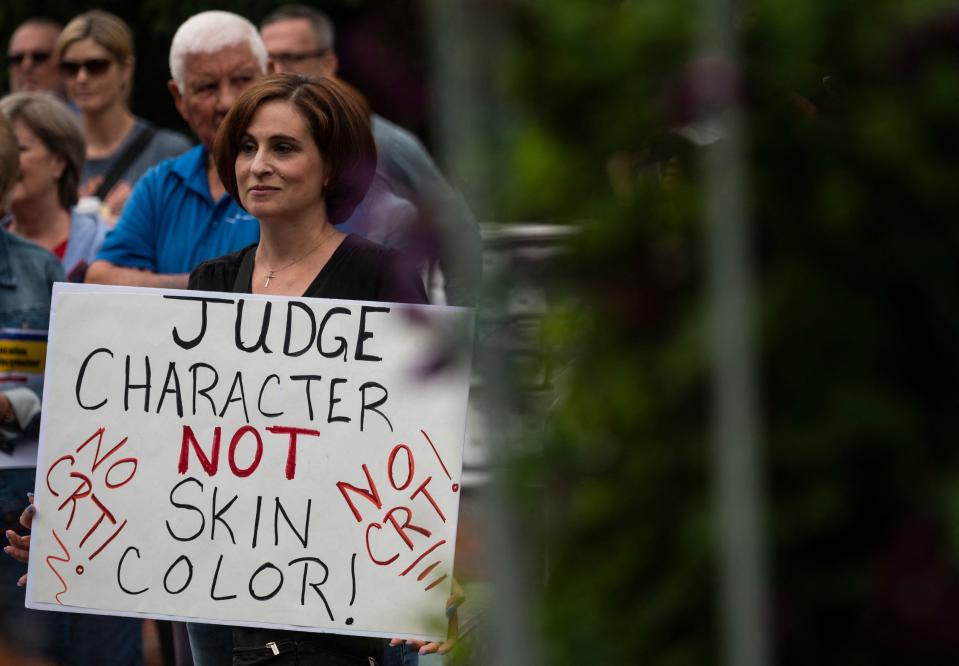GOP sees a new playbook for 2022 midterms in Glenn Youngkin's campaign against critical race theory
- Oops!Something went wrong.Please try again later.
- Oops!Something went wrong.Please try again later.
When Republican Glenn Youngkin beat Democrat Terry McAuliffe in Virginia's gubernatorial race on Tuesday, the GOP not only took note – they took notes.
Youngkin made the teaching of race in public schools, especially under a framework called critical race theory, a major talking point of his campaign. The issue resonated with voters across the state, who gave the first-time politician the win over a former governor in a state President Joe Biden won by 10 points just one year ago.
Now, the GOP wants to do it all over again, betting that continuing to talk about critical race theory to voters will help them retake the House and Senate in the 2022 midterm elections. Already, a GOP memo on lessons from this week's elections, as well as statements from Republican House leadership, make it clear the issue won't be going away anytime soon.
“When an issue is working, a candidate is wise to stick with it,” said Stephen Farnsworth, professor of political science at the University of Mary Washington in Virginia.
Youngkin's success on the subject was all the more remarkable because critical race theory is not part of any public K-12 curricula in the state.
“Granted, the largely made-up story of critical race theory in Virginia schools is about as relevant to education as death panels was to Obamacare. But they work politically so expect more of them," Farnsworth said.
Critical race theory has become a blanket phrase for lesson plans or staff training about diversity and equity.
Already, several Republican lawmakers throughout the country have sought greater sway over what teachers can instruct in schools, often under the banner of pushing back against critical race theory.
Critical race theory a crucial part of GOP strategy
House Republicans took a victory lap over Youngkin's win during a Wednesday news conference.
"I think education is always a top priority, but I think the one thing you will find is the Republican Party will be the party of education," said House Republican leader Kevin McCarthy when asked about the midterms.
McCarthy touted a parents' bill of rights the GOP will soon unveil, saying, "You have a right to know what's being taught in school. You have a right to participate."
A memo from Republican Study Committee Chairman Rep. Jim Banks focused on lessons learned from Virginia and suggested Republicans make education a priority going forward.
“First, the concerns of parents need to be a tier 1 policy issue for Republicans: Youngkin’s success reveals that Republicans can and must become the party of parents,” the memo states.
A sample of ideas on championing education include preventing federal funds from “being used to fund racist CRT curricula in violation of the Civil Rights Act,” and passing the CRT Transparency Act “to ensure parents have access to the curriculum their children are being taught.”
"We learned that parents should be empowered to make decisions about their children's education, not the federal government, " said House Republican Conference Chair Rep. Elise Stefanik, R-N.Y., about the lessons learned from the election during a GOP press conference Wednesday.
Youngkin's success despite having no prior political experience underscored the potency of critical race theory as a campaign issue.
"The GOP spent millions of dollars on disinformation and baseless lies about voter fraud and critical race theory," Alicia Garza, head of the Black to the Future Action Fund, said in a statement.
Saladin Ambar, a professor of political science at Rutgers University, said critical race theory represents an uncomfortable shift in political power for white voters.
"What's important, I think, is the fact that critical race theory reflects an avenue to reaching white voters, whether they're even conscious of it or not, who are experiencing a kind of anxiety about the loss of a certain way of life, the loss of a certain expectation of political power,” said Ambar.
Youngkin’s win has shown that Republicans don’t need to fully embrace former President Donald Trump's demonization of people of color to benefit from him, Ambar said.
"And I guess what Youngkin demonstrated was that he needn't put on the whole uniform and trappings of Donald Trump to do this."
More: Schools keep talking about critical race theory and DEI. What do those terms really mean?
Related: Critical race theory fear a mix of the predictable, the outlandish and the justified

Youngkin's critical race theory strategy
In recent months, the Loudoun County, Virginia, school district in the suburbs of Washington, D.C., was targeted by parents for allegedly adopting critical race theory into its curriculum after plans to make its campus more equitable and inclusive were released earlier this year.
Concerns about the new diversity, equity and inclusion initiative were only heightened by pandemic-related anxieties, last year's racial reckoning and the global Black Lives Matter protests over the deaths of unarmed Black people. School districts throughout the country introduced DEI plans in the wake of George Floyd's murder, when a then-Minneapolis officer kneeled on Floyd's neck for over nine minutes. The officer was later fired and convicted of murder.
The local issue quickly made national headlines. Some parents threatened to sue Loudoun County Public Schools over the new initiatives, which included equity training for employees and allowing transgender students to use the bathroom matching their gender identity.
The school district has said it has not incorporated critical race theory into the curriculum.
Because of its proximity to Washington and its concentration of voters, both Youngkin and Democratic candidate Terry McAuliffe focused heavily on Loudoun County voters during the campaign. Critical race theory became a focal point of debates between the two candidates.

Youngkin routinely blasted McAuliffe for saying, “I don’t think parents should be telling schools what they should teach,” during a September debate.
During the final days of the race, Youngkin released an ad featuring a mother from Fairfax County who waged a campaign to ban Toni Morrison's Pulitzer Prize-winning novel "Beloved" in Virginia schools. In the ad, Laura Murphy says McAuliffe "doesn’t think parents should have a say."
McAuliffe called the attacks from the Youngkin campaign "racist dog whistles."
Voters throughout the state said the debate over critical race theory was a mobilizing factor for them Tuesday.
“It didn’t make me happy that McAuliffe said that, you know, parents shouldn’t be involved with their children’s education,” said Youngkin voter Caryn Vezina at the polls Tuesday.
White anxiety over changing demographics in the U.S.
The demographic shifts in the United States have also played into racial anxieties at the heart of the battle over race and education, experts say.
“I think going forward, what we're seeing in Virginia today and this past election is a reflection on how the multiracial democracy such as ours decides to move forward in party politics,” said Ambar, who is a senior scholar at Rutgers’ Eagleton Center on the American Governor. “But also, how to assuage the fears or at least address the fears and anxiety of the majority population that’s in transition.”
Last decade the nation experienced unprecedented multiracial population growth and a decline in the white population for the first time in history, according to the 2020 U.S. census. The U.S. is now 57.8% white, 18.7% Hispanic, 12.4% Black and 6% Asian.
“The anxiety is anticipatory and so it's not even backlash. It's a kind of preemptive strike about where the country ... where they feel the country is headed, where I think they know it's headed,” Ambar said.
If Democrats are going to counteract Republicans' appeal to white anxiety over race, Ambar said, they “have to be willing to stand up and tell the truth.” Democrats deflate their own constituents by cowing to Republican accusations against them, Ambar said.
“At least Republicans know who their voters are and care about them. Democrats take for granted their voters and consider the perspectives of their opponents in ways that defy a certain kind of logic,” Ambar said.
Many voters don't know what critical race theory is
Polling shows many Americans don't understand or have not heard of critical race theory despite national media and political coverage.
A July Reuters/Ipsos poll found that less than half of Americans are familiar with critical race theory and surrounding debates in their community. The poll also found that three in 10 have never heard of the concept.
Chris Jackson, U.S. senior vice president of public affairs for Ipsos, told USA TODAY that he doesn't think attitudes have changed much since the survey was conducted.
"You're essentially seeing something where people that are maybe a little bit more partisan, a little bit more engaged in the politics are sort of worked up about this. And then a much larger number of people that are not engaging and they don't really care," Jackson said. "But even among those people who are engaged, there's just not a lot of actual knowledge or understanding about what critical race theory actually is."

While a majority of Americans support teaching high school students about the impacts of slavery and racism in the U.S., the initiative has more support among Democrats (86% support teaching about slavery, 85% racism) than Republicans (73% and 58%, respectively), according to the poll.
The online poll was conducted on a sample of 1,004 adults aged 18 and older from the continental U.S., Alaska, and Hawaii between July 12-13.
Jackson said critical race theory has become a culture war flashpoint among conservatives.
"(The theory) has become a shorthand term for people who are anxious that society is increasingly prioritizing people that are not like them. Particularly, it's among race, ethnic lines," he said. "But really, it crosses a number of different social or cultural lines."
"CRT is essentially this idea that society is putting black or Hispanic or Asian, or LGBTQ+ people as more important than white people and there's some white people who believe that whites are being de-prioritized," Jackson added. "The fear of that is what's driving opposition to critical race theory in schools."
Contributing: Isabel Miller, Jay Shakur, Julia Mueller, Jeannie Michele Kopstein, Medill News Service; Aleszu Bajak
Reach out to Chelsey Cox on Twitter at @threalco.
This article originally appeared on USA TODAY: Republican candidates may campaign against CRT after Youngkin win

